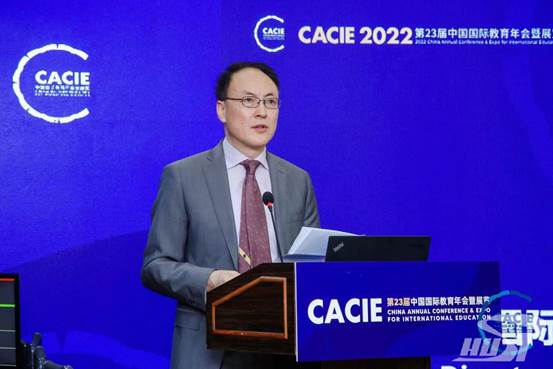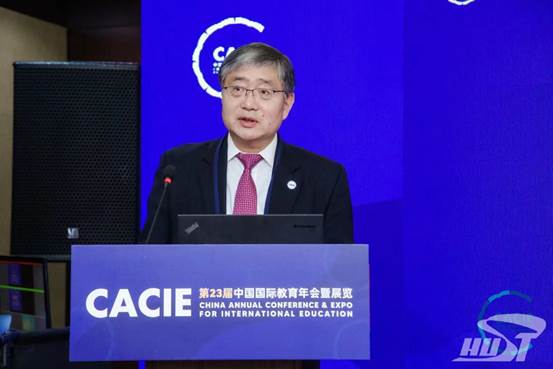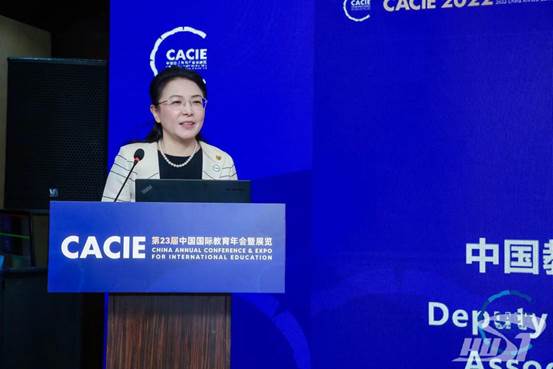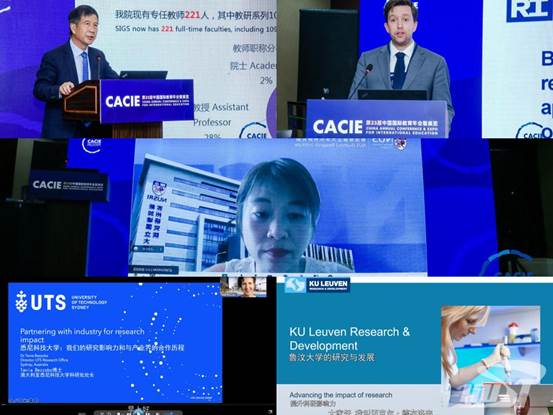On February 17, the "Forum on Exploring the University-Industry Linkage on Research Application: Approaches and Practice from China and Overseas Universities" was successfully held at the Beijing International Convention Center. As one of the parallel forums of the 23rd China Annual Conference & Expo for International Education (CACIE2022), this conference was jointly organized by Huazhong University of Science and Technology (HUST) and the "Double First-class" University Network of China Education Association for International Exchange (DFUN-CEAIE). With nearly 200 representatives from domestic and foreign institutions and enterprises attending the forum on site, 9 university leaders, experts and industry representatives from China, the UK, Germany, Belgium, Australia and Singapore, gave keynote speeches.
Fang Jun, Deputy Director General of the Department of International Cooperation and Exchanges of the Ministry of Education of China, Professor Lu Gang, Vice President of China Education Association for International Exchange, and Fu Bo, Deputy Secretary-General of China Education Association for International Exchange, attended the opening ceremony and delivered speeches, with Chen Jie, Director of Office of International Affairs of HUST, as the host.



They pointed out that, it is the general consensus of the international academic community to strengthen global cooperation on issues common to mankind. Chinese and foreign experts and scholars should learn from each other, deepen cooperation, jointly explore new paths to promote high-quality innovation and development of international industry-university-research-application. Chinese and foreign universities should join hands to build an application-oriented scientific innovation community, and benefit more countries and people. Meanwhile, it’s necessary to strengthen the joint training of talent between Chinese and foreign universities as well as between universities and enterprises, cultivate students' competence, and ensure the foresight, practicality and reliability of talent training.
The reports were respectively made by Chen Jianguo, Vice President of HUST; Xi Guang, Vice President of Xi'an Jiaotong University; Michael Grossmann, Vice President & Head of Bosch Corporate Research & Technology Center Asia Pacific, Bosch (China) Investment Ltd., Germany; Prof. Jon Frampton, Deputy Pro-Vice-Chancellor of University of Birmingham, U.K; Prof. Zuo Jian’e, Associate Dean of Tsinghua Shenzhen International Graduate School; Dr. Daniel Brooker, China Director of UK Research and Innovation Agency, UK; Ms. Cristina Xu, Associate Director of National University of Singapore (Suzhou) Research Institute; Dr. Tania Bezzobs, Director of Research Office at the University of Technology Sydney, Australia, and Dr. Michael De Blauwe, Executive Manager for KU Leuven Research & Development, KU Lueven of Belgium. The presentations were moderated by Liu Wenfeng, Director of the Department of International Cooperation and Exchanges of Xi'an Jiaotong University and Jiang Jing, Deputy Director of Office of International Affairs of HUST. Prof. Shen Jie, Secretary General of “Double First-class” University Network, China Education Association for International Exchange (DFUN-CEAIE) and Dean of the International College of Zhejiang University, moderated the Q&A session.

In the keynote speech, Chen shared the exploration and practice of HUST in strengthening the construction of an innovation platform for basic research, promoting regional integration and innovation by initiating the "Optics Valley of China", laying out an international education and technology innovation area for the future, and fostering a new platform for international research cooperation to address human challenges. He stressed that the university will continue to uphold the concept of "peace and cooperation, openness and tolerance, mutual learning and mutual benefit", and further strengthen educational and scientific exchanges with universities and institutions around the world. HUST will promote joint training of postgraduates and joint declaration of international cooperation projects, cultivate more high-quality technological innovation talent, and contribute to the development of society, promoting scientific progress as well as civilizational exchange and mutual understanding.
Xi Guang introduced the new development path of Xi'an Jiaotong University to promote the deep integration of international industry-university-research cooperation, citing the creation of the Science and Technology Innovation Port in western China, the establishment of the cooperation platform of the University Alliance of the Silk Road, the implementation of the "6352 Project" and the establishment of several international joint laboratories as examples. Michael Grossmann introduced the strategic direction of Bosch and shared the industry-university-research cooperation between Bosch and universities, including HUST, in the fields of distributed computing systems, fuel cells, design simulation, etc. Prof. Jon Frampton, Deputy Pro-Vice-Chancellor of University of Birmingham focused on the university's attempts and explorations in promoting global sustainable development and contributing to green economic development.

In the presentation session, Zuo Jian’e explained the model and concrete initiatives of university-enterprise cooperation and integration-innovation in the cultivation of professional master's and doctoral degrees at Tsinghua Shenzhen International Graduate School from four aspects: coordination of resources by a dedicated institution, top-level design of university-enterprise cooperation, practice of in-depth industry-education integration, and innovative engineering education platform. Daniel Brooker introduced in detail the UK National Research and Innovation Agency's strategic approach to promoting the deep integration of research and industry between the UK and China through programmes such as the International Review Workshop, the Global Incubator and the Sino-UK Agricultural Flagship Challenge. Cristina Xu shared the industry-university-research integration outcome made by the National University of Singapore (Suzhou) Research Institute in such fields as macro-healthcare & food engineering, environment & energy nanotechnology and smart medical information technology as well as its contribution to international technology innovation and regional economic development. Tania Bezzobs presented the case of the University of Technology Sydney's collaboration with the large company Boro Group Australia and the micro enterprise EzyMed, and pointed out the need for universities to use their intellectual capital to build deep connections with partners and to support academic researchers with business development professionals. Michael De Blauwe highlighted KU Leuven's experience and achievements in incubating innovative companies, improving management effectiveness, as well as in the fields of composites and 3D printing, showing the university's blueprint of educating talent through science and building the future through innovation.
The China Annual Conference & Expo for International Education (CACIE) is an annual international education event organized by the China Education Association for International Exchange with the support of the Ministry of Education and approval of the State Council. With the theme of "Reshaping Education—Adaptation and Transformation", this year's conference was held online and offline, with more than 30 parallel forums, 10 bilateral and multilateral conferences and presentations as well as 5 thematic exhibitions held. The conference was attended by Chinese and foreign international education exchange practitioners, education policy makers, leaders of institutions, experts, scholars, representatives of various institutions at all levels and representatives of the business community.
Written by: Wang Jingyi
Edited by: Zeng Zhen, Chang Wen, Peng Yumeng
